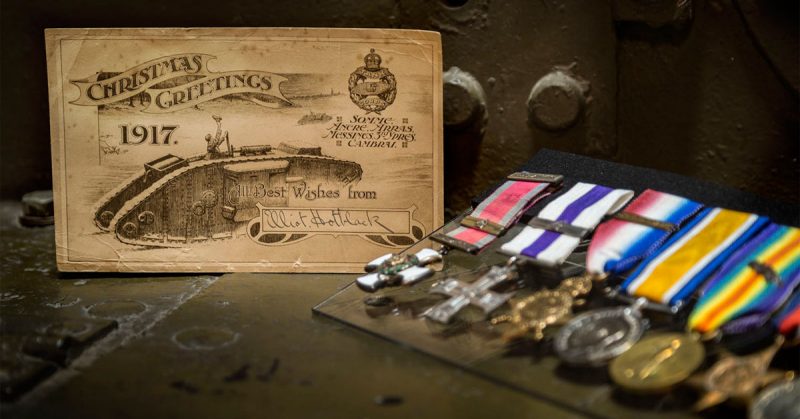A Christmas card sent 100 years ago by one of the First World War’s most heroic tank officers is to go on display for the first time.
Elliot Hotblack sent the simple card from ‘Advance Headquarters Tank Corps’ in December 1917, presumably to his parents in Norfolk.
It includes a print of a crewman waving his cap from a Mark IV tank beneath the words “Christmas Greetings”.
Hotblack’s heroics feature in The Tank Museum’s ‘Tank Men’ exhibition, but the Christmas card has only just been added to the display in the Dorset attraction because of the centenary.
The small postcard-size item includes the Tank Corps’ crest and its battle honours; Somme, Ancre, Arras, Messines, 3rd Ypres and Cambrai.
The cards were printed especially for the Tank Corps which was a little more than a year old.
Hotblack, who signed it with his name in pencil, was one of the most decorated members of the Tank Corps and the list of injuries he sustained is astonishing.
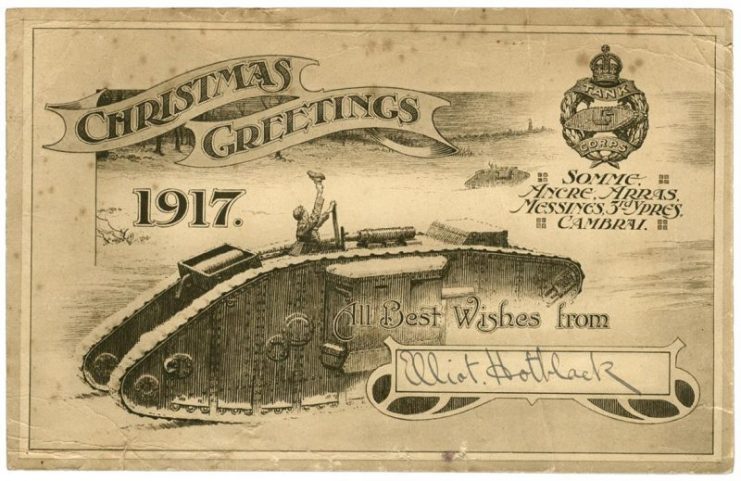
He was born in Norfolk into a brewing family and was at first an intelligence officer attached to the Machine Gun Corps – the forerunner of the Tank Corps.
He was a pioneer in reconnaissance which led to him often venturing past the front lines without the protection of a tank.
Hotblack – nicknamed ‘Boots’ – was awarded four gallantry medals – including the DSO and bar and Military Cross with bar, was mentioned in despatches five times and was wounded six times.
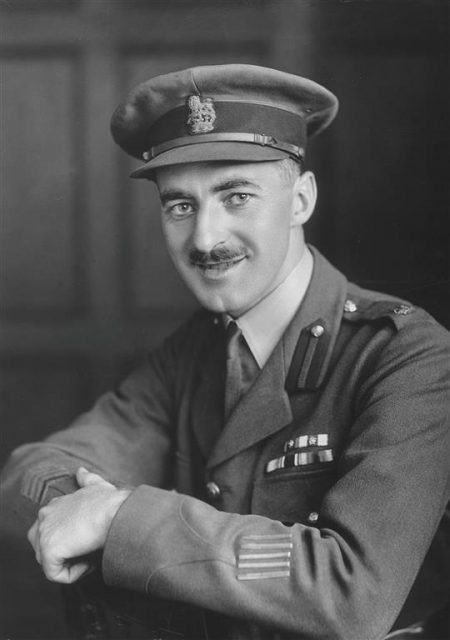
David Willey, curator of the Tank Museum in Bovington, Dorset, said: “Hotblack, who became a Major-General, is one of the most extraordinary early Tank Corps officers.
“He is a boys’ own hero of outstanding bravery but also intelligent, very human and caring. We have an exhibition in which his story is told and he is depicted with a life-size model, and this Christmas card adds another angle to his and the other servicemen’s lives.
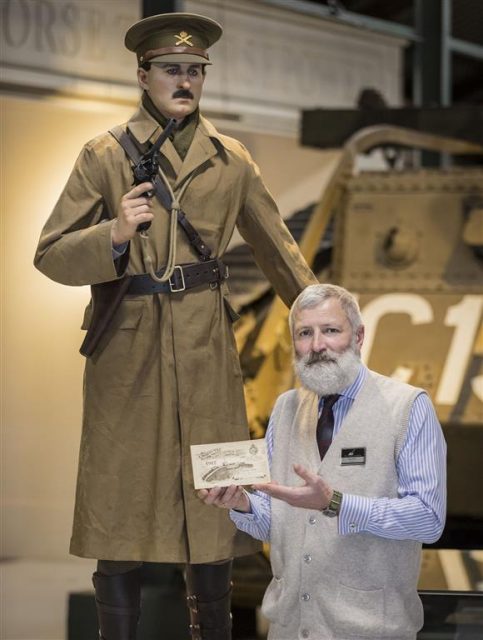
“It is a century since he sent it home from a war we still find hard to imagine or understand, such were its horrors.
“We enjoy our relative peace and safety today because of men like Hotblack whose astonishing bravery was recognised over and over again.
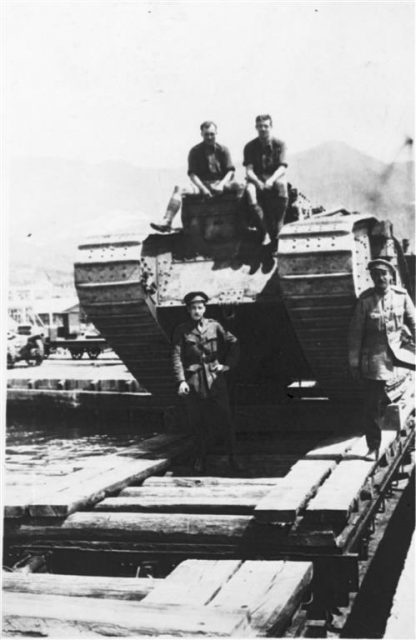
“Despite being on the Western Front in December 1917 he and his men would have been thinking of Christmas and their families and of course whether this might be their last communication with them or whether they’d see them again.
“And yet the cards send a cheerful, optimistic message.
“Christmas cards at the time were commonly sent in postcard form. The elaborate Victorian ones had made way for the simpler sort, and in the 1920s the card and envelope type that we now know became popular.
“This small, modest item from the archive gives us a poignant reminder of how our men in the First World War spent their festive period 100 years ago. We should, and surely can, spare a thought for them and today’s servicemen this Christmas.”
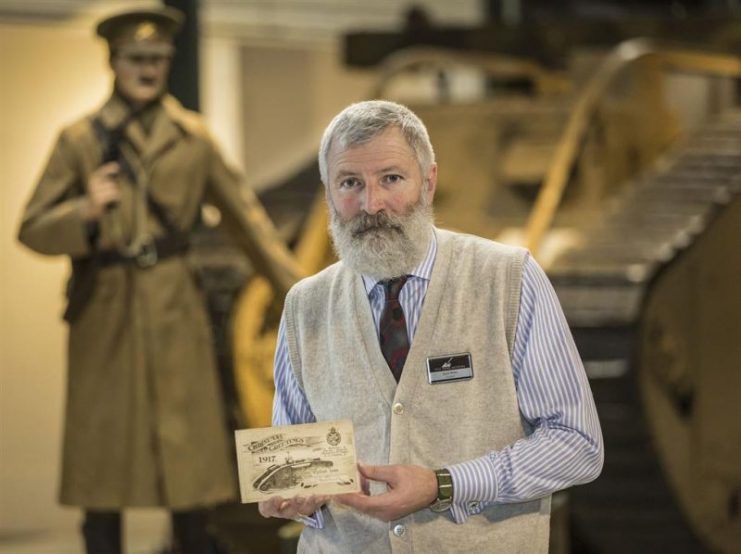
That Hotblack survived the war was remarkable; he was first injured in May 1915 when he was shot by a sniper.
In April 1917 on the first day of the Battle of Arras he suffered serious head wounds but escaped from hospital in order to re-join colleagues.
He trecked five miles through a snow storm with blood seeping through his bandages and managed to convince officers that he was fine.
Three months later he sustained an injury to the leg and then in May 1918 he was again wounded in the head and for two weeks was too unwell to sit up or eat.
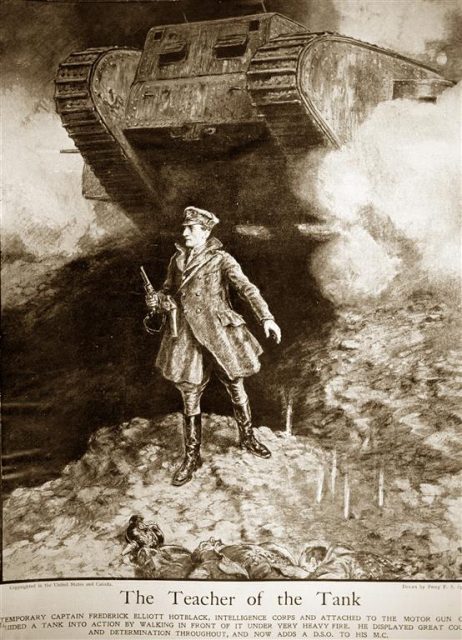
In September that year he was awarded the Military Cross for ‘conspicuous gallantry, initiative and devotion to duty’ and was again injured.
He found a German position blocking an advance and organised two tanks into action against it, riding in one of them himself.
His tank was hit killing four crew and he was injured in the eye, but continued fighting for several hours, got the wounded to safety and arranged infantry for a defence against a counterattack. He was left temporarily blinded.
Finally in October he was returned to the UK for further treatment.
His other medals included the Legion of Honour and the Russian Order of St Anne.
Hotblack continued to serve his country after the war and at the start of World War Two commanded the 2nd Armoured Division before being injured and invalided out of the army.
The bachelor died in 1979.
